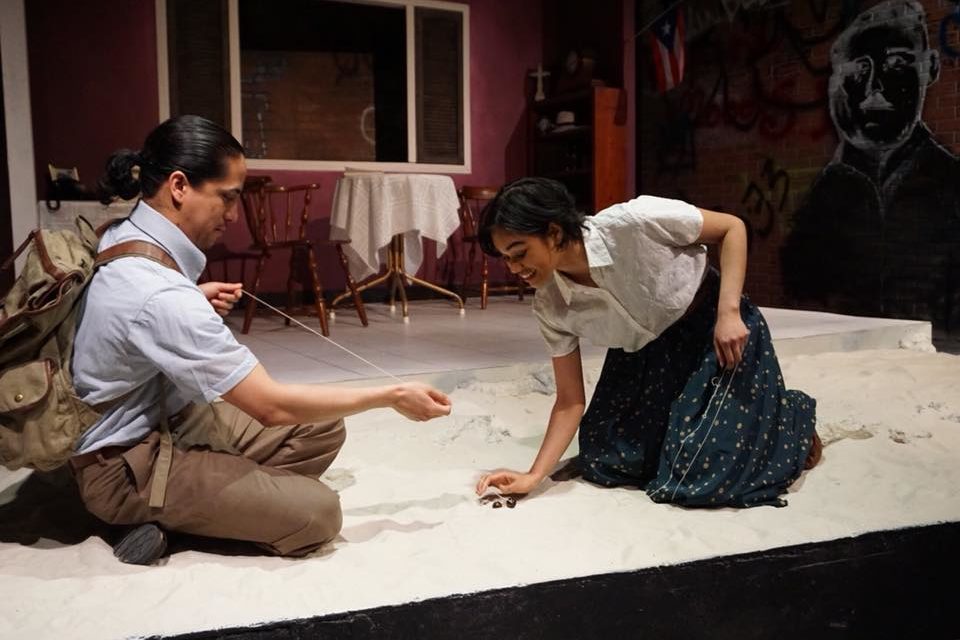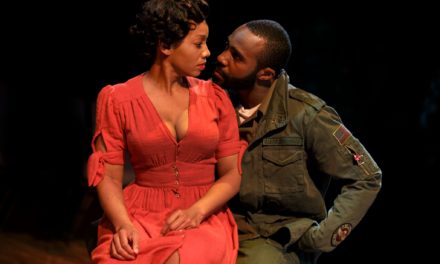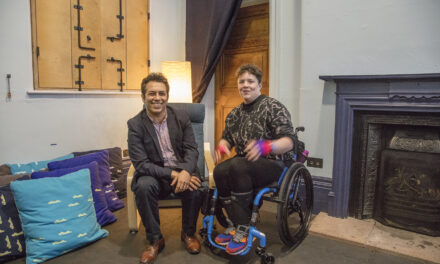New York City-based Puerto Rican playwright Nelson Diaz-Marcano first came to the world of playwriting while studying under the mentorship of the late Professor Jonathan Levy as an undergrad at Stoney Brook University. After graduating with bachelor’s degrees in Cinema and Cultural Studies, Diaz-Marcano moved to New York City and began pursuing playwriting. Diaz-Marcano’s work sheds light on Puerto Rican identity and cross-cultural collisions, ultimately raising awareness of their histories and legacies.
Diaz-Marcano’s plays include The Diplomats, REVOLT!, World Classic, Radical, Prison Song, Revolución: A Love Story, Sweating Bullets, Paper Towels, and Rabiosa. His work has been produced and had readings at the Downtown Urban Arts Festival, Fresh Fruit Festival, Step1 Theatre Project, The Dirty Blondes, Stable Cable Lab Co.’s Livewire, The Secret Theatre, Thespis Theater Festival, Ophelia Theatre Company, and the Midtown International Theatre Festival among others.
In this interview, Diaz-Marcano discusses his journey as a playwright, his recent plays, and the troubles facing Puerto Rico in the aftermath of Hurricane Maria.
Trevor Boffone: How did you become a playwright? What has your journey been like?
Nelson Diaz-Marcano: How I became a playwright is a funny story. It’s funny and it’s not. I kind of fell into it, but it has been coming for a long time. I dabbled a lot in writing when I was a teenager, but it was always to accomplish something else. I started writing poems because I thought it would get the girl (It was the 90’s and I was influenced by movies!). I did songwriting to make a band so I could sing. That backfired and ended with me being booed off stage because who the hell let me sing! By the time I went to college, writing had become a hobby I rarely dedicated time to. But then something happened that I never thought would, I fell in love with theater. Growing up in the lower middle class in Puerto Rico, art is not something you are encouraged to do. Maybe music and film, but theater? Theater was for raunchy comedies and children’s shows only! But here I was taking an acting class during my first semester and loving it!
As I started getting more involved I went from acting to production management, which prompted me to read a bunch of plays. I was one of the people in charge of picking shows for the next season of the undergraduate theater company, so I was reading around 4 to 5 plays a week. The more I read, the more an urge to write started to form. It didn’t help that at the time I was starting to reflect on my childhood and life in Puerto Rico more. I began to explore my heritage more, digging deeper into our history and the history of Latin America. I started to become vocal about our struggles and the history that had been swept below the rug. Then it hit me, most of the people I talked to did not know this history. They didn’t know who Miguel Piñero was, who Migdalia Cruz or José Rivera were. I had read all these plays and rarely had I seen my people represented correctly. And the ones that did it, were unknown to half the people doing theater around me. How could you spread our history and community, if the stories digging into them were being ignored?
Growing frustrated with that fact, I decided to take a playwriting class with Jonathan Levy to explore the urge and to see if I could use this dormant talent as a weapon to raise the awareness that was denied to my generation and many others. It was that class that showed me how much I actually loved writing, but it was the collaborative aspects and the love I had developed for theater that made me a playwright. It would take me years for me to consider myself a playwright, but you can pinpoint at the moment I finish my play for that class as the moment I started going on this path. Funny how it still happened just because I wanted to accomplish something else. Now I can’t think of accomplishing much without writing being part of it.
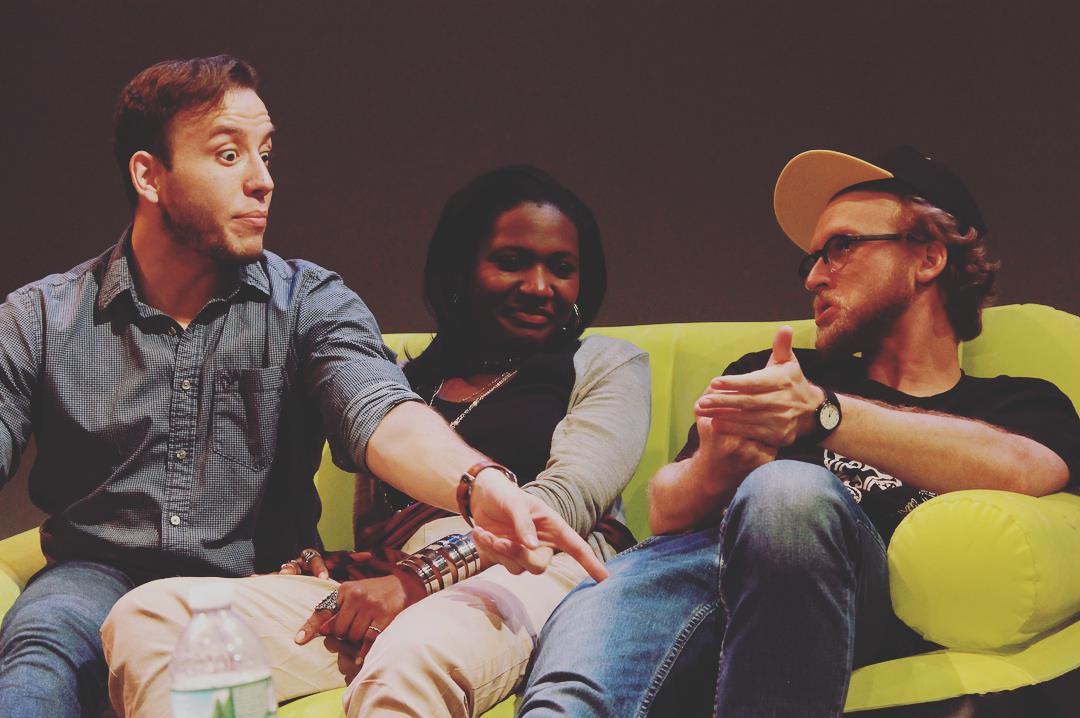
Carlos Angulo, Ricki Lynée, and Chris Callahan in The Diplomats. Photo Credit: Blayze Teicher.
TB: What have been the highs? The lows?
NDM: There have been many highs and some lows. But there’s one high connected to a low that helped me in finally defining myself as a playwright. I wrote consistently from 2009 till 2012, working on almost every festival, producing shows left and right. I was spoiled. I was also young, thought myself to be a producer more than a writer. Thought I could do it all and nothing would be sacrificed. Boy was I wrong…
When I wasn’t working on a production of one of my shows, I was putting together events and theater festivals under the name of Strike 38! It was a company, but it was basically me. In 2013, my playwriting had started to get some momentum but I also was now producing a show almost every month besides my plays. I had realized some time ago, I was getting exhausted, and I started to get desperate, so I started writing a play that would be cool and unique, even if I didn’t have anything to say. I just wanted to sell it. The name of the play was Sweating Bullets. It had a reading during the fall of 2012 which got a lot of great feedback but everyone had the same questions “What are you trying to say?” Praised for its cool visuals and dialogue, the play made people wonder if that was all there was to it. Which is not something I was known for. After all I started writing because I wanted to bring insight to the ailments of our society. But I brushed it off as I thought by the time the production would go up in June, I would find a reason for the play. Well, 5 events, one play festival, and two productions of one-acts later, I still couldn’t find a reason for its existence. Then it came the hits, Radical had gone up in February during a snowstorm…not many people came to see it. This was followed by Prison Song losing the Downtown Urban Arts Festival despite the incredible reception it had. Then Sweating Bullets went up…and it was a hit! But the same question remained, and not only it remained, but we lost the festival main prize due to a technicality. At this point I was so burnt out, I decided to take a break. I just didn’t care anymore. I was starting a new job, and while I did some writing, it became less and less important. Especially playwriting…It was a dark time, I didn’t realize how lost I was till much later.
It wasn’t until one day when talking to my friend Rebecca Aparicio that I realized I was missing theater. I had been reviewing it for some time, and just like reading plays form the urge to explore writing, watching them make me want to do it. So I dusted off the barely-seen Radical and told Rebecca that I was going to submit it to the Downtown Urban Arts Festival and that I wanted her to direct it. Let’s see what comes from it. During the rehearsal process, a new play started developing in my head and I found myself excited. Then Radical opened, and it was sold out. Not only did it sell out, but it ended up winning Best Play that year! By the time the announcement had been made I already had the first draft of the play that will give me a few years later my first World Premiere. I knew then that I was a playwright first. That producing was something I once loved, but that writing had been a big part of me throughout my life. And not only that but even before we won the award. Working on it gave me a joy I had not felt since I stopped working on it. Then it was clear. I had many highs after that, but reaching that understanding is the highest. And it came from the lowest.
TB: You’ve recently been very involved with the newly-formed NYC Latinx Playwrights Circle led by Guadalís Del Carmen and Oscar Cabrera. What has that experience been like for you?
NDM: There are no words I can say to describe these two individuals and the group they have put together that would give it justice to how I feel about it, but I will try. Guadalís and Oscar are some of the hardest working individuals I know in the industry. They are also extremely supportive. And that translates to this group. To have a community in which you feel safe is incredibly essential. It helps you experiment, it makes you comfortable sharing doubts, it creates an atmosphere you are not afraid to fail. And that’s what this experience has been. It’s like finding that family you’ve been looking for, finding the tribe you’ve been searching for. Honestly, I would do anything to keep this group going because while it’s in its early days, you can already see the impact it’s having in many of us. Imagine how much more power can it gain? How many of your playwrights that do not feel encouraged in our communities can find this group and suddenly grow? This group is always looking to fortify its members and fight for the rights of our community in the industry. So to answer your question, the experience has been incredible.
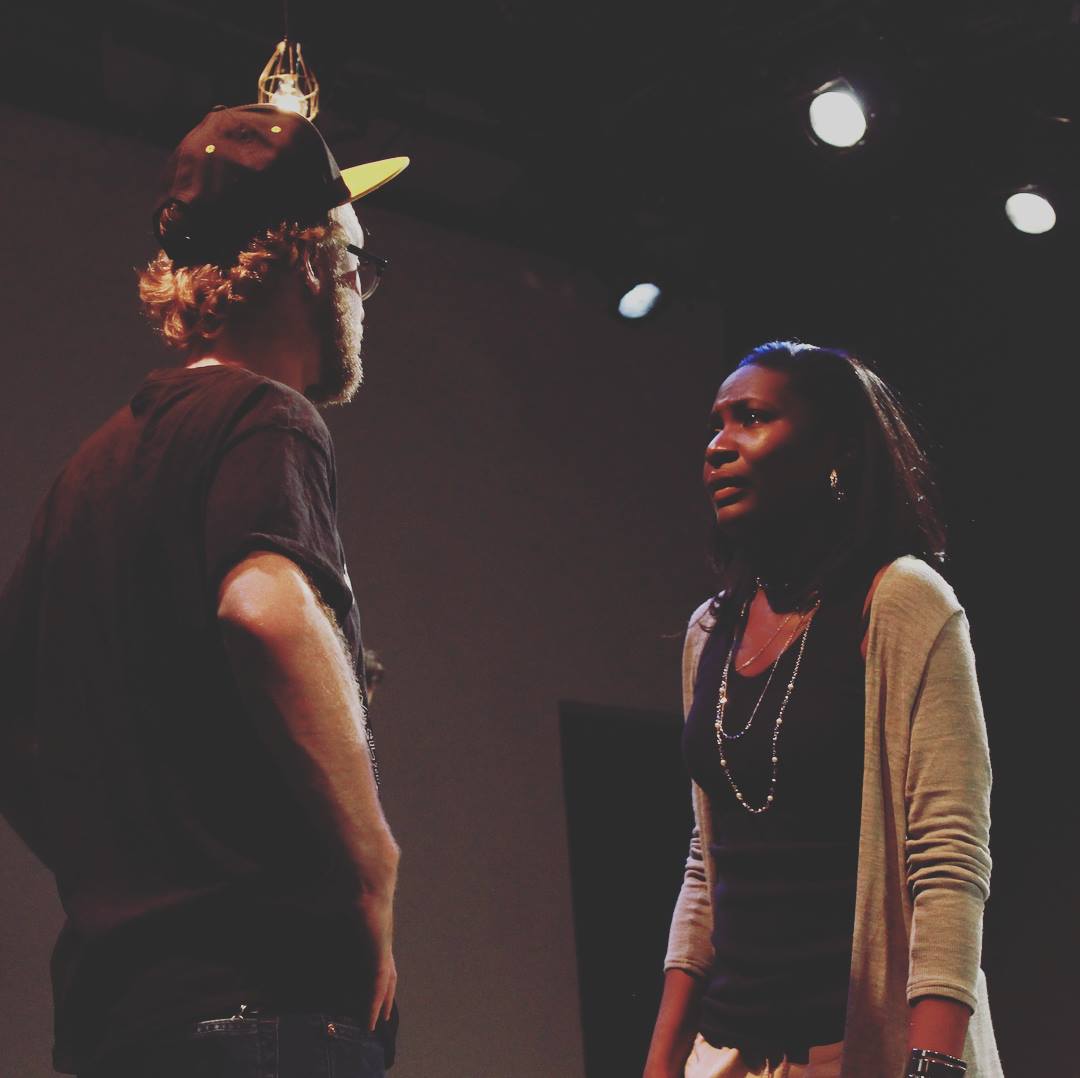
Chris Callahan and Ricki Lyné in The Diplomats. Photo Credit: Blayze Teicher.
TB: I first got to know your work through your play The Diplomats, which recently was named Best Production at the 2017 Fresh Fruit Festival. Can you tell us more about the play? Why this play? Why now?
NDM: The Diplomats is a play that came from a deep need to understand what was happening to us as a country. I wrote it right after Election Day in 2016, as I had been seeing friends fighting friends for months. Things had gone awry around us, and enemies were born where friendships were ending. And then Trump won. I saw people crying in the streets after the result was announced. I saw hope stomp on the street and the reaction to it was violent. People denounced families, racism became bold once again, immigrants were more scared than ever…I didn’t know what to do. I was angry, feeling hopeless, and unable to console my friends that needed it. So I did the one thing I know how to do beyond marching and calling representatives, I got on my own personal soapbox. My writing…and in three days I had a first draft.
It was like an exorcism, writing about these three friends that had to deal with this new reality. That had to adapt and learn how to behave after a whole lifetime being taught another way. That had to confront, like many of us had to, this new world, one that has been divided and in which you no longer were able to stay neutral. Suddenly we were all exposed to what America really was, and while many of us were not surprised, to others it changed their whole life. It made me both more tolerant and more outspoken. When it went to Fresh Fruit, the elections were still fresh (no pun intended) in the audience’s mind, and it touched them. Everyone got their own version of what the play was about. I agreed with some, others not at all, but the fact that it was getting to people made me happier than any other accomplishment. That it won the Best Play was a testament to the incredible team I worked with. Blayze Teicher is a goddess of direction and that cast! Ricki Lynée, Carlos Angulo, and Chris Callahan are exactly who I wrote.
I think this is all bittersweet though, as it had just a run at the Downtown Urban Arts Festival and I found it to be more poignant today than a year ago. Our fear was that it would be outdated. Sadly it isn’t. Which makes me glad is getting published later this summer! But not happy about our current state of affairs.
Trevor: Like many Puerto Rican playwrights, you have turned to playwriting to make sense of the catastrophic effects of Hurricane Maria on Puerto Rico and the lack of meaningful response by the United States government. Your short plays Rabiosa, Paper Towels, and El Yunque In English all tackle different aspects of post-Maria Puerto Rico. Can you tell us more about what you hope your plays add to this conversation? What do you hope audiences gain from having seen or read your work?
NDM: Let’s be clear about something: this devastation is not Maria’s fault. I mean, yes, it was the hurricane that destroyed the island but it was the faulty infrastructure, the lack of preparation, and the dire economic crisis that made it this destructive. Maria was the bullet, but years of colonization and negligence were the gun. And it was a combination of a completely corrupt local government and the indifference of the United States government which ultimately pulled the trigger. They let us take the bullet, then now are watching us bleed to death while they pick our pockets. That’s the reality of my island. And that’s the reality I need people to understand with my work. But also, I want them to see something that is rarely shown, our spirit.
With each of these plays, I want to spotlight this dichotomy that so well represents who we are. Paper Towels is a study on the effects this tragedy had on the mental health of the populations while spotlighting the importance family has. Rabiosa, on the other hand, explores the anger that loss leaves us with and how you can find hope in that anger. Hope for a new future, one you got because you survived. El Yunque In English is the comedic one of the three but might be the darkest. It focuses on separation anxiety and the desperation that forced migration provokes on the community. With these three plays, I hope to reach out to those people that do not know us beyond our stars and stereotypes and expose them to not only who we are, but what had made us that way. Most people do not know Puerto Rico is part of the United States, a fact that still blows my mind, which means most people do not realize we are American citizens. But that’s who we are, and it needs to be part of every conversation because ultimately this is not a conversation of a country being ruined by a natural disaster. This is a conversation about a government ignoring and letting its citizens die. Around 4,645 of them.
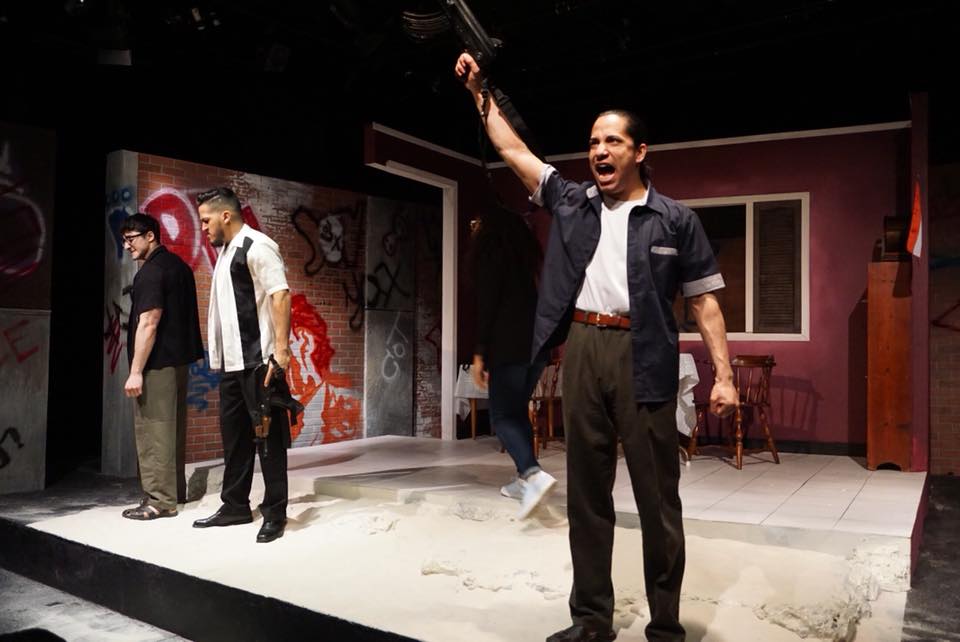
Jesse Montoya, Dominic Guevara, and Ulises Acosta in REVOLT!. Photo Credit: Jesse Pazmiño.
Trevor: Speaking of Puerto Rico’s complicated relationship with the United States, your play REVOLT! just had its world premiere at Chicago’s Visión Latino. What was that experience like? How did audiences in Chicago respond to your work?
NDM: Incredible! This is my play about Puerto Rico, about where I grew up, my love letter. And with it, I wanted to educate people about our shared history with the United States, about our heroes/terrorists and the abuse we’ve sustained. To see it on stage was a beautiful experience for me. Visión Latino Theatre Company staged such a strong and loving production. I really have to say thank you to Xavier Custodio for his dedication to the piece, for trusting my words and creating something so impactful. It is because of his work in it, that I manage to accomplish what I wanted with the piece: to educate and raise awareness of our history. Our erased history and boy did it get a reaction!
I had people I didn’t know message me on Facebook, not only to give me their feedback but to discuss the history of the play. So many people that got angry because they just found out about all these atrocities our ancestors had to go through just so we had a little bit of comfort. A fleeting sense of comfort at that. My dream is to reveal the pain so we can all unite and find the glory. A country that does not know their history are doomed to fail. And we’ve been doomed, but maybe, maybe we can rise and it starts with knowing our past.
TB: What’s next for you?
NDM: A lot! First, I mentioned The Diplomats will be getting published, so getting ready for the day Paper Towels opens on June 8 at The Brick and El Yunque In English will be showcased on June 13 at the Nuyorican Poets Cafe. After those are done I will be helping my theater making partner Rebecca Aparicio with her musical Pedro Pan, which is running during the first week of the NYMF this year. Then I got Rabiosa at the end of August. In between that, I’m going to work on getting my latest full-length Into The River I Went, which focuses on the effects of rape culture and its connection to classism, ready for a public reading. Besides that, I’m going to be attending as many meetings of the Latinx Playwright Circle as I can and ingest as much theater I can possibly go to. Hopefully, a trip to Chicago is in the works too!
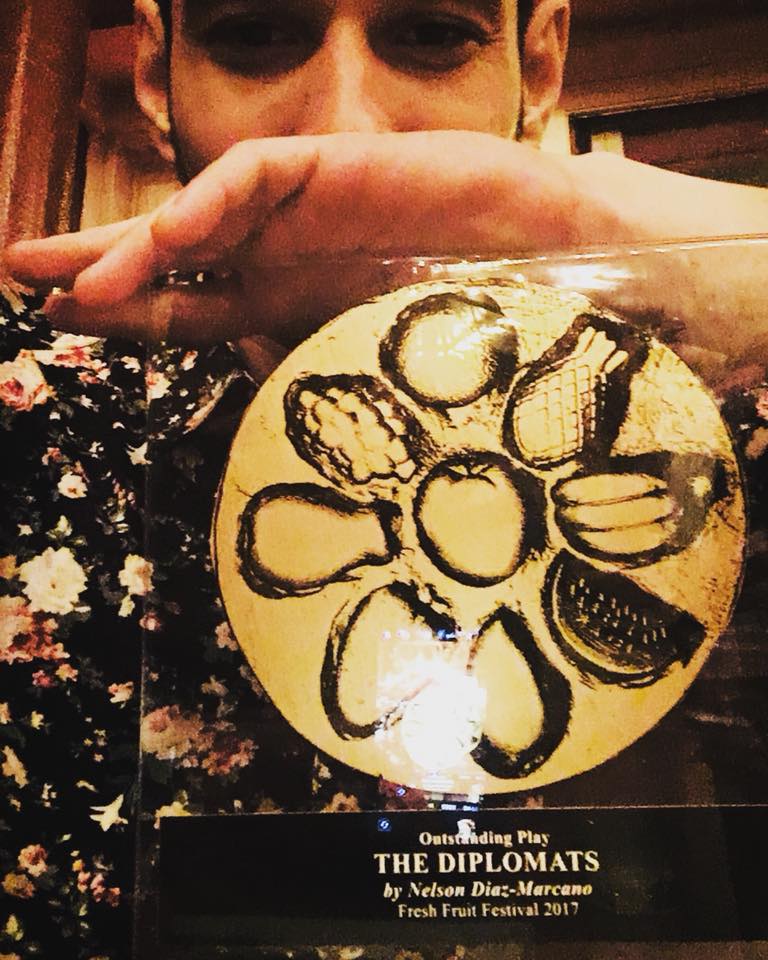
Nelson Diaz-Marcano with the Outstanding Play Award for The Diplomats at the Fresh Fruit Festival 2017.
This post was written by the author in their personal capacity.The opinions expressed in this article are the author’s own and do not reflect the view of The Theatre Times, their staff or collaborators.
This post was written by Trevor Boffone.
The views expressed here belong to the author and do not necessarily reflect our views and opinions.

